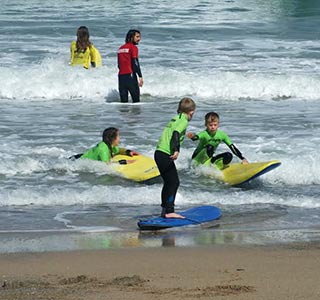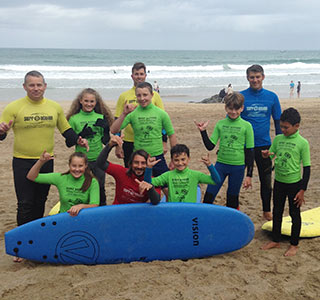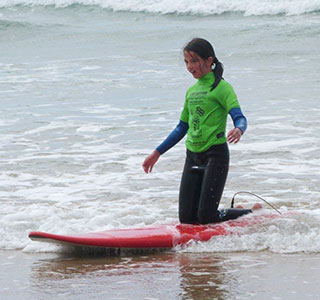The Surf Action Joined-Up Recovery Model recognises that the front line is not the only place where battles are fought and that partners, parents and children are also deeply affected by a loved-ones military experiences and often bear a heavy burden if injuries, be they physical or psychological, are sustained. PTSD, as an invisible injury, can be especially hard for families.
The severity of PTSD for many affected veterans means that they are unable to work and the onus of providing financially for the family also falls on their partners. This, combined with the fact that they may well struggle to attend or remain at social gatherings or take part in ‘normal’ family activities (such as visiting a children's park or meeting friends for a meal); may sometimes self-medicate with drink and behave inappropriately as a result and that service families are often located far from extended family can make it almost impossible for the partner to build or maintain the friendships and relationships that might help to sustain them. Surf Action recognises that it is essential that the partner of a PTSD sufferer can find a healthy outlet for their own stress because their batteries need re-charging too. The better the partners can care for themselves the better they will be able to care for the rest of their family.
NICE guidelines on support for families - Summary
In its treatment guidelines for PTSD NICE emphasise the importance of providing support for the family when treating someone with PTSD. They state that while “families and carers have a central role in supporting people with PTSD depending on the nature of the trauma and its consequences, many families may also need support for themselves.” They make it clear it is essential when working in this field to “be aware of the impact of PTSD on the whole family and where appropriate ensure that the families of PTSD sufferers are fully informed about common reactions to traumatic events, including the symptoms of PTSD.
In addition to the provision of information, families and carers should be informed of self-help groups and support groups and encouraged to participate in such groups where they exist.” By ensuring that this support, education and awareness are all available within Surf Action, by ensuring through good communication and face-to-face conversations that the left hand is always aware of what the right is doing and that the two are working towards the same end we are able to create an environment where families and partners are best able to provide the support that the PTSD sufferer needs but are also able to enjoy the best quality of life for themselves.
I Have Never Been To War…
I have never been to war
I have never held a gun
But I feel the repercussions
I have never smelt the burning
But I can see the fear
I have never heard machine gun fire
But I can see the shake it causes..
I have never been to war.
I have never fought for my country
But I can see the scars it leaves
I have never been a soldier
But I hear the marching of his dreams
I have never been on a battlefield
But I feel like I am behind enemy lines
I have never been to war
But I live through it every day
Wife of a veteran supported by Surf Action
Surf Action’s Home Front is a support group where partners and those closely involved with the life of veterans can gain access to support, both practical and therapeutic, can find time for themselves, have fun, can meet to share experiences and expertise and, perhaps most importantly, can form strong peer support relationships and know that they are not alone.
The Home Front is also where families have the opportunity to come together to strengthen bonds made distant or put under strain by military life and experiences. Through regular activity days, many of which take place out of doors and in the beautiful beach and coastal environment, we offer families the opportunity to have fun together in a setting which fully understands and takes account of the needs of those involved.
Extract from the National Institute for Health and Care Excellence (NICE) Guidelines – Post Traumatic Stress Disorder (PTSD) 2005 (Reviewed 2011)
1.5 Support for families and carers
Families and carers have a central role in supporting people with PTSD. However, depending on the nature of the trauma and its consequences, many families may also need support for themselves. Healthcare professionals should be aware of the impact of PTSD on the whole family.
1.5.1 In all cases of PTSD, healthcare professionals should consider the impact of the traumatic event on all family members and, when appropriate, assess this impact and consider providing appropriate support.
1.5.2 Healthcare professionals should ensure, where appropriate and with the consent of the PTSD sufferer where necessary, that the families of PTSD sufferers are fully informed about common reactions to traumatic events, including the symptoms of PTSD and its course and treatment.
1.5.3 In addition to the provision of information, families and carers should be informed of self-help groups and support groups and encouraged to participate in such groups where they exist.
1.5.4 When a family is affected by a traumatic event, more than one family member may suffer from PTSD. If this is the case, healthcare professionals should ensure that the treatment of all family members is effectively coordinated.
1.6 Practical support and social factors
Practical and social support can play an important part in facilitating a person's recovery from PTSD, particularly immediately after the trauma. Healthcare professionals should be aware of this and advocate for such support when people present with PTSD.
1.6.1 Healthcare professionals should identify the need for appropriate information about the range of emotional responses that may develop and provide practical advice on how to access appropriate services for these problems. They should also identify the need for social support and advocate for the meeting of this need.
1.6.2 Healthcare professionals should consider offering help or advice to PTSD sufferers or relevant others on how continuing threats related to the traumatic event may be alleviated or removed.
(Due for review in 2015)






Support Us
Donate
Fundraise
Volunteer
Provide Employment Opportunities
Sponsors
Supporters
Contact
Education
Education & Empowerment
Events
Copyright © 2024 Surf Action. All Rights Reserved. - Charity No:1140191